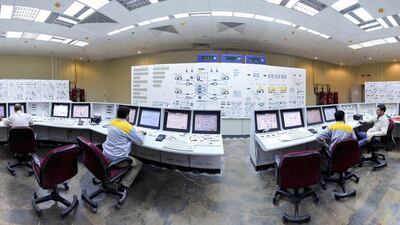Russia’s state nuclear company said it was planning to supply new fuel to Iran’s controversial Bushehr nuclear power plant before the end of the month, moving quickly to keep power supply from the plant flowing.
Russia was one of six world powers that reached a deal last month with Iran to lift nuclear-related sanctions in return for an oversight regime that will curb Iran’s nuclear programme over the next decade.
Russia has been Iran’s partner in developing its nuclear energy plant at Bushehr, on Iran’s Arabian Gulf coast, having taken over from German firms to complete the protracted project and bring the first reactor online in 2011.
TVEL, the nuclear fuel-making unit of Russia’s Rosatom, on Tuesday said that last month’s deal on sanctions cleared the way to reestablish a banking relationship with the Atomic Energy Organisation of Iran, the joint operator of Bushehr with the Russians, thus allowing TVEL to restart nuclear fuel deliveries.
“The deal [means] that Iran’s nuclear reactor will be connected to the country’s energy system on time,” said a TVEL spokesman.
“Loading of fresh fuel with the presence of international experts during a planned maintenance of the plant is scheduled for September.”
TVEL said Russia’s support of Bushehr, the first nuclear plant to go online in the Middle East, “serves as a benchmark for the further development of a peaceful nuclear energy production across the region”.
Indeed, Russia has shown that it is keen to play a major role in the development of nuclear power in the region. It has been making diplomatic efforts this month to push this agenda, including during state visits from the leaders of Saudi Arabia, Egypt, and the UAE that included discussions of nuclear energy.
Russia has already secured a number of firm deals in the region, as well as initial cooperation agreements.
This year, Saudi Arabia and Russia signed an agreement to cooperate on the development of nuclear energy. Although the deal covers only various types of information sharing, Russia has expressed a desire to play a part in building up to 16 reactors by 2030 in Saudi Arabia, which shares the UAE’s ambition of meeting growing electricity demand and freeing up hydrocarbon resources for export and industrial use.
Russia is keen to sell Saudi Arabia its VVER (water-water energetic reactor) design, which is used at Bushehr.
It is already building the Akkuyu plant on Turkey’s Mediterranean coast. The project is expected to start commissioning the first of four planned reactors in 2020.
Also, as part of Russia’s active nuclear energy diplomacy this year, the president Vladimir Putin and his Egyptian counterpart, Abdel Fattah El Sisi, signed a deal in February to fulfil the long-held desire of Egypt to build a plant on its Mediterranean coast.
amcauley@thenational.ae
* The article has been amended since it was first published. The company reported as a key supplier to the UAE's nuclear programme should have been mentioned as Tenex and not TVEL. Similarly it was Tenex and not TVEL that was one of six companies to sign a deal in 2012 to supply fuel to the UAE. The mentioned delegation visit to the uranium enrichment plant at Novouralsk was part of a recent audit that the Emirates Nuclear Energy Corporation conducted of Tenex's supply chain, as part of its approved annual audit plan for 2015.

